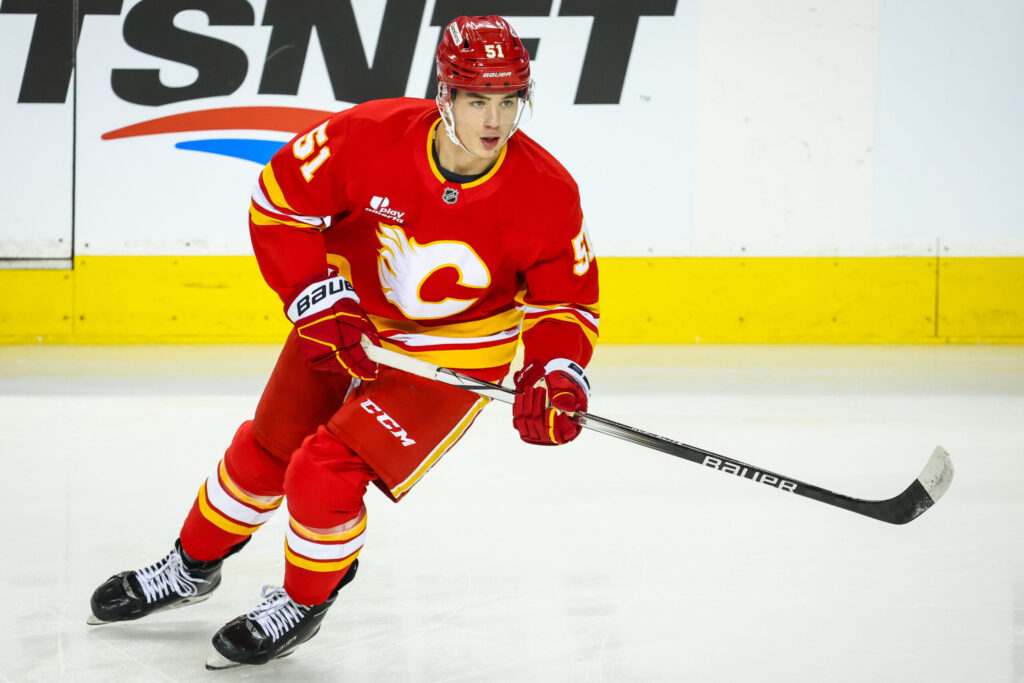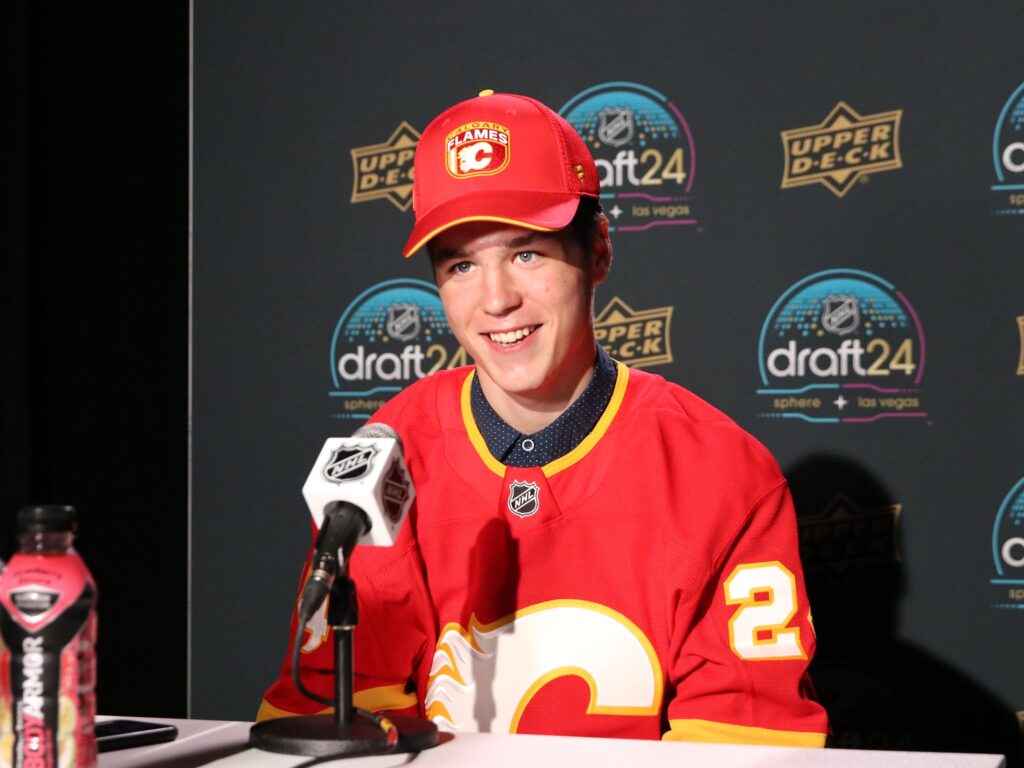Every NHL preseason, narratives emerge from the fog of exhibition hockey. Most are fleeting—a veteran finding his legs, a journeyman trying to hang on. But every so often, a prospect doesn’t just knock on the door; he tries to kick it down. For the Calgary Flames, prospect Matvei Gridin’s preseason performance has created the best kind of problem for management: a genuine, difficult decision. The 2024 first-round pick has been so dynamic, so undeniably effective, that he has forced his way from “one to watch” to “what do we do with him?”
Letting the Puck Do the Talking
When it comes to making a team, a player can either talk a good game or play one. The soft-spoken Russian has unequivocally chosen the latter. In a preseason where many established players are just shaking off the rust, Gridin looked like he was in mid-season form, finishing as the Flames’ leading goal-scorer with three tallies.
These weren’t just garbage-time goals, either. They were displays of elite, projectable skill. Against the Seattle Kraken, he sniped the team’s only regulation goal, a laser beam that blew past veteran netminder Philipp Grubauer. As if to prove it wasn’t a fluke, he later ended that same game in the shootout with a move he calls the “Gridin Signature,” a slick deke he used to score five times last year, roofing the puck with authority. In his final audition against the Winnipeg Jets, he showcased his hands in tight, tucking a nifty backhand through the legs of Connor Hellebuyck—one of the league’s premier goaltenders.

Goaltender Dustin Wolf, who has faced Gridin’s shot daily in practice, wasn’t surprised. “Excellent shot,” Wolf noted. “He’s got a pretty neat release… Every day he picks your corners. He’s going to score a lot of goals in this league.”
The underlying data backs up the eye test. In four games, Gridin was an offensive driver. Statistically, he was one of the team’s most productive forwards, ranking second in goals per 60 minutes and fourth in both expected goals and shot attempts per 60. At five-on-five, his dominance was even more pronounced: he led all Flames forwards in shot-on-goal share and sat third in expected goal share. He didn’t just shoot; he created, and he did so with a speed-and-shot combination that might already be the best in Calgary’s prospect pool.
Also on the EDGE – Can the Flames Turn Last Season’s Momentum into This Season’s Mandate?
Coach Ryan Huska clearly saw something, giving the rookie a prime opportunity on the top line alongside Morgan Frost and Matt Coronato against Seattle. The trio clicked immediately, becoming the team’s most effective line that night. It was a vote of confidence that Gridin earned, and one that he admitted helped him feel more comfortable at the NHL level.
The Waiver Wire Wall
For all the on-ice evidence supporting Gridin’s case, the biggest obstacle he faces has nothing to do with his play. It’s the cold, hard reality of the NHL Collective Bargaining Agreement and roster management. Matvei Gridin is waiver-exempt.
This simple fact makes him the easiest piece to move. The Flames can send him to the AHL’s Calgary Wranglers without any risk of another team claiming him. He can continue his development, get top-line minutes, and be the first call-up when an injury inevitably occurs. It is the path of least resistance.
The alternative is fraught with peril. To keep Gridin on the opening night roster, another player must be moved. That almost certainly means exposing a waiver-eligible player to the league’s other 31 teams. Would the Flames risk losing a player like Rory Kerins, who has worked his way up the organizational ladder? Or what about valued role players like Adam Klapka or Martin Pospisil, who bring specific elements the team covets? It’s a high-stakes game of asset management. Losing a player for nothing to make room for a rookie, no matter how talented, is a scenario most general managers actively avoid. It’s a bitter pill to swallow when the “safe” move is sending down the player who has arguably earned his spot the most.
To Rush or To Refine?
Beyond the immediate roster crunch lies a broader philosophical question about player development. Coach Huska himself touched on it, stating that young players “need to play.” The debate is timeless: is a 19-year-old better off playing 9-12 minutes a night in the NHL, likely in a sheltered bottom-six role, or playing 18-20 minutes in all situations in the AHL?
The argument for the Wranglers is compelling. It would allow Gridin to be the offensive focal point, run the top power-play unit, and acclimate to the pro game’s pace and physicality without the pressure of the NHL spotlight. It ensures, as many in management circles would say, that “no damage is done” to his long-term potential by rushing him. He can work on the defensive details of his game and build strength against men before being asked to contribute to a Flames team that desperately needs more goal-scoring.
Last season, Calgary languished near the bottom of the league in offensive production. A 36-goal scorer in the QMJHL last year, Gridin represents precisely what the organization lacks. The temptation to inject that skill into the lineup immediately is immense. As Huska said, “First impressions are important, but last impressions are critical.” Gridin’s final preseason performances have made the decision excruciatingly difficult.
Also on the EDGE – Can Calgary’s Kids Drag the Flames Back to the Playoffs?
The Huberdeau X-Factor
Ultimately, the entire debate might be rendered moot by a single variable: the health of Jonathan Huberdeau. The star winger’s “day-to-day” status looms over the final roster cuts. Should that status change to a stint on the Injured Reserve, a roster spot would magically open. The waiver dilemma would be postponed, and Gridin would almost certainly get his shot.
If Huberdeau is ready for opening night, however, management will be forced to make its toughest call of the preseason. Do they play it safe and send their most electrifying young forward to the AHL, or do they roll the dice on the waiver wire to keep a player who looks ready to score now?
Regardless of where Matvei Gridin starts his season, one thing is certain: he has arrived. His preseason was not a fluke; it was a statement. He has proven to the organization and its fans that he is a key piece of the future. The only question left is whether that future starts now.
Created with the aid of Gemini AI
